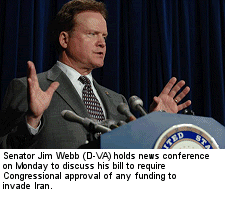Webb: No Funds For Iran Attack Without Congressional Approval
 Freshman Senators don’t typically jump right onto the Senate floor and start proposing a lot of legislation in their first few months in Congress and Senator Jim Webb (D-VA) has been no exception. But the two pieces of legislation Webb has authored have been big and meaningful.
Freshman Senators don’t typically jump right onto the Senate floor and start proposing a lot of legislation in their first few months in Congress and Senator Jim Webb (D-VA) has been no exception. But the two pieces of legislation Webb has authored have been big and meaningful.I reported in January about Webb introducing a bill the day the new Congress began to provide an old-school, all-inclusive G.I. Bill to members of the Armed Forces who have served since September 11, 2001 -- an outstanding and overdue piece of work that will hopefully pass this year.
And on Monday, for his second Senate bill, Webb proposed S. 759, legislation that would prohibit the use of funds for military operations in Iran without the express approval of Congress.
"The purpose of this legislation is to restore a proper balance between the executive and legislative branches when it comes to the commencement of military activities," said Webb, while introducing his bill. "The major function of this legislation is to prevent this administration from commencing unprovoked military activities against Iran without the approval of the Congress."
Webb then explained that his legislation preempts rash action on the part of George W. Bush by using the only mechanism available to Congress: the Constitutional process of prohibiting all funding for such action.
"Unlike the current situation in Iraq, where cutting off funds might impede or interrupt ongoing operations, this legislation denies funding that would be necessary to begin such operations against Iran in the first place," said Webb, a highly-decorated Vietnam Veteran. "The administration's past failure to engage with Iran diplomatically in a meaningful way, coupled with what Iran could perceive as preparations for a military strike, creates a potent brew that easily could lead to miscalculation on both sides."
The scholarly Webb went on to give a brief lecture on the 1787 Constitutional Convention and the extent to which delegates carefully decided that no President should be given the power to decide with whom America should go to war or to undertake aggressive actions without the consent of Congress.
"The President's powers to initiate military action were to be for the purpose of repelling sudden attacks -- and this is the language I have used in this legislation," said Webb.
Webb also reiterated his call for diplomacy in Iran, saying that, despite the Bush administration's prevailing strategy of attacking first and asking questions later, the road to greater stability in that part of the world is based on talking to people and not bombing them.
"It is time we move forward to end our military involvement in Iraq, and the path to doing so is not to widen the war into Iran. Proper robust diplomacy will enable us to bring greater stability to the region, to remove the American military from Iraq, to increase our ability to defeat the forces of international terrorism," he said.
An interesting part of Webb's speech occurred when Virginia's new Senator quoted delegate James Wilson from the Constitutional Convention on the limits to presidential power to wage war.
"This system will not hurry us into war, it is calculated to guard against it," Webb quotes Wilson as saying in 1787. "It will not be in the power of a single man, or a single body of men, to involve us in such distress."
Now there's a concept I think we can all embrace.

















<< Home